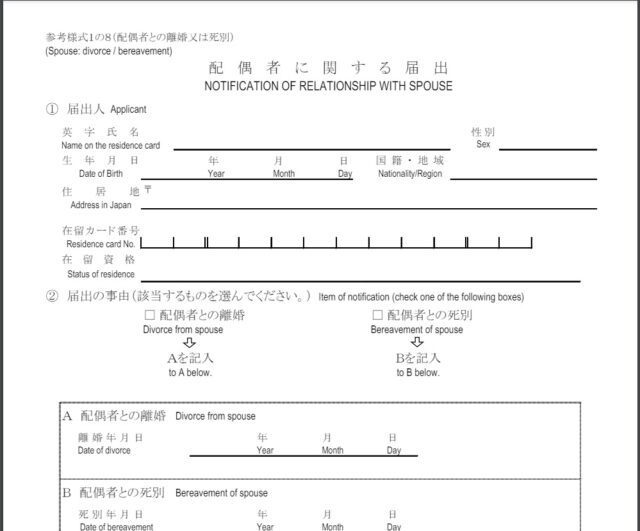Divorce and Visa procedures in Japan

2024,04,25
Even when married to Japanese nationals and residing in Japan, various circumstances may lead to marital discord and eventual divorce. In this blog post, I aim to explain the divorce procedures in Japan and whether one can continue to live in Japan after divorce.
This blog in Japanese 日本人と離婚した時 離婚定住ビザ
Divorce Procedures in Japan

When a foreigner married to a Japanese national seeks a divorce, the applicable law becomes a crucial consideration. According to Article 27 of the General Rules of Law, which determines the applicable law for divorce, it states, “When one of the spouses has a habitual residence in Japan, the divorce shall be governed by Japanese law.” Hence, in the case of couples where one spouse resides in Japan, Japanese law, specifically the Civil Code, applies.
Divorce proceedings typically follow the route of mutual consent, known as a consensual divorce if both spouses agree to the divorce. They sign the divorce notification and submit it to the mayor or head of the local municipality.
Documents to be submitted:
- Official Divorce Notification (requires signatures of both spouses and two witnesses)
- Resident Certificate (Juminhyo)
- Family Register Extract (Koseki Tohon) if applying outside of the registered domicile
*For foreign spouses, excluding cases of name or nationality changes, attached documents are not required.
In cases where disputes arise over the divorce itself or divorce conditions, mediation by the Family Court or divorce proceedings may be necessary.
Continued Residence in Japan after Divorce
One common concern upon divorcing a Japanese spouse is whether it’s possible to continue living in Japan. Under Japanese immigration law, foreign nationals require some form of residency status (visa) to remain in Japan.
Foreigners holding statuses such as permanent residency or work visas (e.g., Engineer/Humanities/International Services) face no visa-related implications after divorce and can continue residing in Japan seamlessly.
However, foreigners with “Spouse of a Japanese National” visa will need to complete several procedures.
During Divorce Proceedings
Currently, individuals undergoing divorce proceedings, engaged in negotiations, or undergoing mediation are permitted to extend or change their residency status, such as renewing the “Spouse of a Japanese National” visa to “Permanent Resident” or “Designated Activities.”
Post-Divorce
Within 14 days of the divorce’s finalization, individuals must report to the Ministry of Justice or the local immigration office. Failure to do so may result in penalties, potentially affecting future visa applications.
For those wishing to remain in Japan without returning to their home country, switching to another residency status (visa) is mandatory within six months of the divorce. Failure to do so may lead to the revocation of the “Spouse of a Japanese National” visa unless valid reasons are provided.

Visa Status Changes
Examples of permissible changes to other residency statuses following divorce from a Japanese spouse include:
– Changes to Long Term Resident Visa (so-called Divorce Visa) for individuals with a long marriage or residence period in Japan.
– Changes to Long Term Resident Visa (Divorce Visa) for individuals granted custody or guardianship of a Japanese child.
– Changes to work visas (e.g., Engineer/Humanities/International Services) for individuals meeting the criteria stipulated for each type of employment visa.
– Changes to Long Term Resident Visa for individuals of Japanese descent.
Requirements for ”Divorce Visa”
The Divorce Visa falls under the category of “Residence without Announcement.” This means that it is not subject to publicly announced requirements, as the Minister of Justice evaluates each case individually to determine whether entry and residence are permitted based on the nature of the activities involved. Therefore, specific requirements are not publicly disclosed for Divorce Visa. While precise requirements are not publicly disclosed, based on previous experiences, the following factors are typically considered:
- Approximately three years of marriage duration.
- Stable income and financial security.
- Good conduct and law-abiding behavior.
- Lengthy period of residence in Japan.
Note Regarding the Divorce Visa
The Divorce Visa is a special category known as “Residence without Announcement,” and therefore, returning to one’s home country and re-entering Japan to obtain a Divorce visa is not permitted. The Divorce Visa application is typically only accepted as a change from either the “Spouse of a Japanese National” or “Spouse of a Permanent Resident” visa.
Conclusion
Obtaining a Divorce Visa is subject to individual assessment, with no guarantee of approval. For those considering applying, please feel free to contact us via the inquiry form for personalized assistance.
Profile
Ami Ito Immigration lawyer in Tokyo, Japan
– Spent high school years in the U.K. and graduated from a local school.
– Studied mainly intercultural communication at Sophia University’s Faculty of Foreign Languages, English Department.
– Worked in the overseas department of SEIKO for 11 years after graduation.
– Over 10 years of experience teaching English to high school students, with a TOEIC score of 970 and a Class A level in the United Nations Associations Test of English.
– Serves as a board member in charge of international affairs at the Chiba Administrative Scrivener Association.
– Officially registered on the Financial Services Agency’s “List of Professionals (Administrative Scriveners) in Chiba Prefecture capable of providing services in foreign languages.”
News and Blog








